Horses need to drink the right amount of water every day to remain happy and healthy, and it’s up to horse owners to make sure their equine family members stay hydrated. But if you’re just getting started in horse care, you might not know how to ensure your pet drinks enough to prevent dehydration.
To gain clarity on watering horses and what it entails, check out our guide below.
In This Guide
How Much Water Do Horses Need?
According to Dr. Laura Pylman, DVM, at Mid-Michigan Equine Services, PLLC, in Laingsburg, Michigan, the basic water requirement for an average size horse is about 30 liters, or just under 8 gallons of water per day.
The amount of water that an individual horse needs daily depends on several factors, including:
- The horse’s diet
- Their weight
- Their age
- Their activity level
- The climate (temperature and humidity level) of their environment
Dr. Pylman says that certain health conditions, such as lactation in mares or Cushing’s disease, can also play a role in how much water an individual horse needs to drink daily.

Horse Watering Supplies
In addition to natural water sources like ponds and streams, there are various products and watering systems that make it easy to give your horse water. Options include:
Troughs
A water trough is a basic way to give water to your horse. However, it needs to be kept as clean as possible to stop algae and bacteria, and standing water can attract insects like mosquitoes. Additionally, stagnant water can become unappealing to horses, so it’s important that the water is regularly refreshed or kept in motion to maintain its freshness and encourage horses to drink an adequate amount.
“It’s also important to be sure that, in a group setting, there is enough room for less dominant horses to have ready access to the water, and that a bossier horse isn’t guarding it,” says Dr. Pylman.
Pails and Buckets
Compared to troughs, pails and water buckets are smaller and easier to move around as needed. You can find pails in various sizes, so you can keep several on hand.
These need to be cleaned often to keep bacteria and algae at bay, and water should be dumped and replaced often to ensure it’s always fresh and clean.
Automatic Waterers
An automatic horse waterer can help you save time and reduce effort. It’s connected to a water supply line and fills itself up, as needed, to maintain the right amount of water.
“Automatic waterers can be great, as the water supply will constantly replenish and usually stay a bit fresher with new water coming in frequently,” says Dr. Pylman.
But there are some drawbacks to consider. According to Dr. Pylman, it can be hard to monitor how much water your horse drinks from an automatic waterer unless there’s a gauge that’s checked regularly. Also, you need to check the waterer multiple times each day to ensure it’s functioning properly.
“When horses are first introduced to a particular waterer, they may not understand how to activate the fill,” says Dr. Pylman (some require a lever to be pushed). Other horses may be frightened by the noise of the filling water. “Most horses learn to overcome these issues quickly, but they should be monitored closely for the first several days,” says Dr. Pylman.
De-Icers and Water Heaters
De-icers and water heaters can be useful in the winter months when your horse’s water is at risk of freezing or becoming too cold. Generally, horses prefer water that’s 45-65°F, so they might drink less water if it isn’t within this temperature.
Dr. Pylman says there are a few things to watch out for when using these products, including stray voltage. She recommends checking them often to make sure they’re functioning properly and aren’t shorting to the tank or overheating.
Dehydration in Horses
Dehydration is common in horses and has multiple causes, such as:
- Lack of water, e.g., the water has frozen, there isn’t enough of it, or it’s hard to access
- Social issues in the pasture, such as dominant horses blocking access to water for other horses
- Water that has an odd smell or flavor
A horse can be at greater risk of dehydration when the weather is hot or humid, and when they’re active and sweat too much. But they can also become dehydrated in cold conditions if they don’t drink enough water.
Stressed horses might not want to drink, and this can increase their risk of dehydration, especially if they’re also sweating from the stress.
Certain medical problems could boost the risk, too. “Dehydration can be caused by illness that results in excessive water loss or decreased water consumption,” says Dr. Pylman.
Symptoms of dehydration include:
- Reduced energy
- Decreased appetite
- Elevated heart rate
- Decreased urine output
- Dark urine
- Tacky, dry or sticky gums
- Slower capillary refill time (the amount of time it takes for the gums to return to a normal pink color after pressing on them with your finger)
- Reduced skin elasticity (this can be seen when tenting the skin, aka pinching it to see if it bounces back to normal right away)
- Sunken eyes
Preventing Dehydration in Horses
Dehydration can cause other problems in horses, such as colic and kidney damage. Therefore, preventing it is crucial to your horse’s health.
Start by providing a constant supply of clean water that’s easy for your horse to access. When needed, give your horse electrolytes to encourage them to drink.
“For preventing issues, I usually recommend 1-2 tablespoons of salt twice daily in the feed, or mixed with water and given as a salt slushy in their mouth,” says Dr. Pylman.
Horse Watering Tips for Cold Weather
Generally, as mentioned, horses prefer water that’s 45-65°F. Tips for keeping your horse’s water at the right temperature in cold weather include:
- Use heated buckets or heated troughs to provide water at a warmer temperature
- Add hot water to your horse’s trough multiple times a day
- Use a water heater or de-icer when the temperature drops
Horse Watering Tips for Hot Weather
During the summer months, you may need to clean water containers more often to eliminate bacteria, algae and insects. Tips for keeping the water temperature cool when the weather is hot include:
- Add ice to warm water to cool it down
- Use an automatic waterer to provide water that’s cooler and fresher
- Switch to lighter-colored water containers, and move them to shaded areas
Horse Watering Tips for Traveling
Dr. Pylman recommends the following when preparing your horse to travel.
About 24-48 hours before departure:
- Offer your horse free choice grass hay (aka unlimited access to grass hay). “Hay acts like a sponge in the horse’s gut and holds lots of extra water,” says Dr. Pylman.
- To entice your horse to drink more, give them salt and electrolytes.
- Provide continuous access to water.
On the road:
- For picky horses, line a large plastic trash can with an unscented, extra-large trash bag and fill it with water. Tie the bag securely so you can take it with you. This way you can give your horse the water from home that they’re used to.
- Offer your horse water whenever you stop during your trip.
- Don’t hang a bucket of water in a moving trailer, because it could spill and cause a slippery floor.
FAQs About Watering Horses
Q:
How long can a horse go without water?
Q:
How do I know if my horse needs water?
Q:
Can you give a horse too much water?
Q:
Why are some horses so picky about their water sources?
Watering horses might seem challenging at first, but once you understand horse health, find the right products and establish a routine, you can help your horse remain hydrated.
Expert input for this story provided by Dr. Laura Pylman, DVM, of Mid-Michigan Equine Services, PLLC in Laingsburg, Michigan.
More About Horses
Share:















